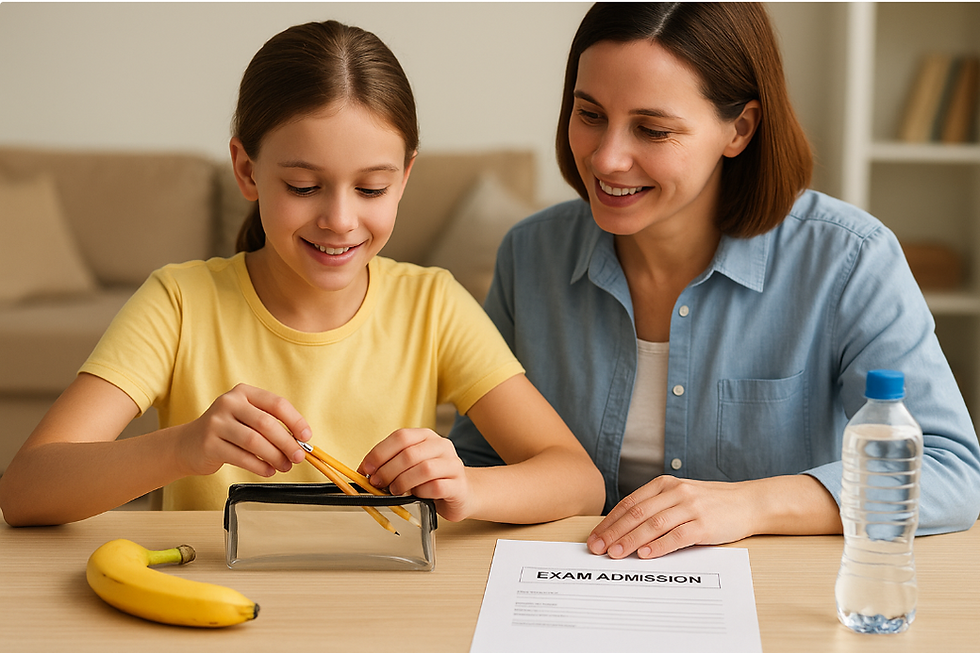Confidence, Calmness & Care: The 11+ Exam Day Essentials
- Progress Academy

- Aug 16, 2025
- 3 min read
The days leading up to the 11+ exams can feel nerve-wracking for both children and parents. Excitement and anxiety often go hand in hand, but with the right preparation, routines, and mindset, your child can approach the exams calmly and confidently.
This guide gives you step-by-step advice on what to do in the days before the exam, the night before, and on the big day itself - along with tips on the best foods, routines, and parent strategies to ensure success.
Top 5 Exam Tips at a Glance
Keep routines steady - don’t add stress with late-night cramming.
Pack essentials the night before - avoid last-minute panics.
Start the day with a slow-energy breakfast (oats, fruit, protein).
Arrive early and stay calm - a relaxed start sets the tone.
Encourage, don’t pressure - focus on effort, not perfection.

The Days Leading Up to the Exam
Do:
Review strategically: Focus on weak areas using summary notes and flashcards. Short, timed practice papers are better than endless revision.
Keep a steady routine: Balance study with rest, meals, and play. Structure gives children a sense of calm.
Encourage positivity: A few words of encouragement each day help build confidence.
Relaxation techniques: Deep breathing, stretching, or a short walk can ease nerves.
Keep a register: Write down exam dates, formats (GL, CSSE, multiple-choice, written, etc.), locations, and reporting times.
Plan the journey: Do a trial run to the exam venue to check traffic, parking, and timings.
Don’t:
Avoid last-minute cramming: It causes stress and confusion.
Don’t overwhelm: Quality practice beats quantity.
Don’t cut sleep: Tired minds struggle to focus.
The Day Before the Exam
Do:
Light review only: Stick to topics your child feels confident about.
Pack essentials:
2–3 sharpened HB pencils (in a clear case)
a pen (if the exam needs it)
Eraser & sharpener
Exam Registration Slip and/or ID
Water bottle
Small snack (banana, nuts, or granola bar)
Relax in the evening: Read a book, watch a favourite TV show, or play a calm game.
Sleep early: Ensure a full night’s rest.
Double-check details: Confirm start time, venue, and travel plans.
Don’t:
Avoid new material: It only causes stress.
Don’t skip meals or hydration: Balanced nutrition helps with focus.
The Day Before the Exam
Do:
Light review only: Stick to topics your child feels confident about.
Pack essentials:
2–3 sharpened HB pencils (in a clear case)
Eraser & sharpener
Exam slip/ID
Water bottle
Small snack (banana, nuts, or granola bar)
Relax in the evening: Read a book, watch a favourite TV show, or play a calm game.
Sleep early: Ensure a full night’s rest.
Double-check details: Confirm start time, venue, and travel plans.
Don’t:
Try and learn new material: It only causes stress.
Skip meals or hydration: Balanced nutrition helps with focus.
During the Exam
Do:
Read instructions carefully.
Pace themselves in: Allocate time per question/section.
Stay calm: Skip tough questions and return later.
Use breaks wisely: Snack, hydrate, and relax.
Double-check answers if time allows.
Don’t:
Rush: Accuracy beats speed.
Get distracted: Stay focused on their own paper.
Leave blanks: Make educated guesses if unsure.
Foods That Boost Exam Performance

Eat More Of:
Oats & whole grains – steady energy release.
Fruits & vegetables – vitamins and antioxidants (bananas, berries, leafy greens).
Nuts & seeds – brain-boosting healthy fats (almonds, walnuts, pumpkin seeds).
Lean protein – eggs, chicken, tofu for lasting energy.
Plenty of water – hydration supports focus.
Avoid:
Sugary snacks (sweets, pastries, fizzy drinks).
Processed/junk food (greasy, high-sodium meals).
Caffeine (not suitable for children; may increase anxiety).
One-Week Countdown Example
7 days before:
Light revision + trial run to the exam centre.
3 days before: Timed mock paper + gentle review.
1 day before: Pack bag, light review, early bedtime.
Exam morning: Healthy breakfast, calm conversation, early arrival.
Parents’ Role on Exam Day
Your calmness is your child’s calmness. Children often mirror their parents’ moods.
Stay positive: Say “Do your best, that’s all we ask.”
Avoid over-questioning: Keep chat light and cheerful.
Be supportive, not pressuring: A calm, smiling send-off is the best gift you can give.
Final Thoughts
Success in the 11+ isn’t just about knowledge - it’s about preparation, confidence, and calmness. By following these practical steps, you can help your child walk into the exam hall with a clear mind, steady energy, and the reassurance that they are fully supported.




Comments